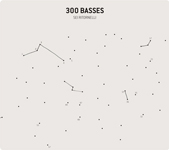|
|
 |
Dusted Reviews
Artist: 300 Basses Album: Sei Ritornelli Label: Potlatch Review date: Oct. 12, 2012 |

|
|
|
 |
Throw this one on for a blindfold test and it’s unlikely anyone will narrow in on the instrumentation. Toss in the name of the ensemble, “300 Basses,” and you won’t give away any hints. Sure, there’s the wheezy, bass groans and rumbles that start things out, but this is clearly not a bass recording. It’s only when the members of this trio are revealed, all credited with accordion and objects, that things start to click. Barcelona-based Alfredo Costa Monteiro is probably the best known of this crew, through his solo improvisations and collaborations — with musicians like Ferran Fages, Ruth Barberán and Pascal Battus — or via his sound installations. Swiss musician Jonas Kocher also runs in impressive circles, working with musicians like Michel Doneda, Burkhard Beins and Urs Leimgruber. Italian Luca Venitucci rounds things out, himself a well-established improviser along with a member of the Zeitkratzer ensemble.
Take a listen to these Sei Ritornelli (Italian for “six refrains”) and one immediately hears how these three have latched on to the quirky mix of mechanical and acoustic properties of their instruments, utterly reworking them in ways that belie any traditional notions. Sure there are elements of bellows-driven reediness and the rich resonances of the expanding and contracting sound box. But just as often, this sounds like a hive of microtonal reed players buzzing against thrumming walls of electronics, though given each member’s propensity for extended acoustic playing, there’s likely no electronic processing going on.
Each of the six pieces operates within very specific sonic parameters. The opening “Fuoco Fatuo” delves down into the lowest registers of the accordions, accentuating the somber, shuddering, organ-like harmonics and overtones as the three tranquilly traverse the collective structure. The transition to the shredded shudders of “Abbandonato” is a jarring leap, as abraded textures get dragged across each other, sending off wild sheets of oscillating of overtones. Listen to this one and “Mala Carne,” an insistently seething torrent of raging clatter and that wouldn’t be out of place on a straight-on noise cassette, and it leaves you scratching your head as to how the three managed to goad these sounds out of their accordions.
“Gira Bile” is the first piece where one can ferret out the accordion as the sound source, but even here, repeating loops of off-kilter chords sputter in and out of phase, creating skewed harmonic intersections shaded with punctuations of metallic rattling. “Maledetto” starts out with what might be mistaken as a sine tone that slowly morphs into a buzz of difference tones set over the hushed percussive detail of pushed and released keys and buttons; the very underpinnings of the instrument are being laid bare under a stark sonic focus. The closing “Fantasma” acts as an effective framing mechanism to the opening piece, transposing the dark bass tonalities to a crescendoing arc of mid-range tremolo shot through with eerie shadow tones.
Costa Monteiro, Kocher, and Venitucci have managed to assemble a recording that utterly transforms their accordions into skirling, quavering and shuddering sound sources. But once one gets over the novelty of the timbres, it is the way the three shape the collective form that carries this outing.
By Michael Rosenstein
|







